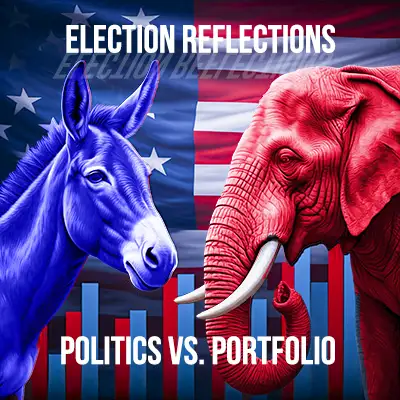

With the impending election, we haven’t had too many conversations lately where the topic didn’t come up. Everyone wants to know how the election will impact their investment portfolios. As humans, it is easy for us to pontificate about our perceived pros and cons of the candidates, but as you all know, we’re not big fans of the qualitative. There is too much room for error. So, on this topic, as with all others, we turned to the data.
There was a study released a few weeks ago that looked at various potential drivers of stock market returns around presidential elections. The data went back to 1928. It showed that there is often a knee-jerk reaction right after the election. Volatility can spike, particularly if it was a close election and the outcome was uncertain. The stock market dislikes uncertainty, so surprises can have an outsized impact.
A good example of this was the 2016 election. Most people, and certainly the polls, seemed to think that Hillary Clinton would win. When it was announced that in fact Donald Trump would be the next president, stock market futures sold off to the tune of 1,000 points overnight. When the market opened at 9:30, much of this loss had been recovered, and by the end of the day, the Dow was up 800 points. Talk about volatility.
In terms of stock market returns, the impact is more muted. The stock market generally is flat in the month prior to election day, then rises a bit in the month after. This is probably a bit of a relief rally now that the election is over, and the path forward is at least a little more certain in terms of economic policy. The impact is larger in close elections, but even then, the average return in the following month is less than 3%.
If the Republican candidate wins on election day, the stock market tends to go up by a couple of percentage points and drop about a percent if the Democratic candidate wins. However, that has been a transitory impact, since by day 30 following the election, the market tends to converge toward a 1.5% return regardless of which candidate won. Stereotypically, Republican platforms support reduced regulation and lower taxation, both favorable to economic growth and elevated corporate profits, so this short-term pattern is not surprising, even if it is fleeting.
So, the short-run impact of the market isn’t material unless you’re a day trader. For long-term investors, any impact is usually minimal and abates within 30 days. But let’s look at the candidates’ policy proposals that could impact the longer-term.
Harris has proposed a number of tax increases, including on corporate profits, stock buybacks, realized capital gains, and even unrealized capital gains. She is also proposing handouts for first-time homebuyers and price controls on grocery stores. Finally, Harris is proposing to eliminate federal income tax on tip income.
The proposed tax increases could all be considered a drag on economic growth since they divert money from the productive economy. The housing benefit and price controls could be inflationary. In fact, Nixon’s (a Republican) price controls on food, gas, and other items likely contributed to the stagflation of the 1970s. So, most of these proposals would be bad for our economy and long-term investors.
The proposal to eliminate tip income would be stimulative, but it is probably still bad policy. Why benefit one source of income over another? Why should the cook pay more in taxes than the waiter? This smells of gimmicky, election year policy.
Is Trump any better on economic issues? Not necessarily. He is proposing to cut taxes on corporations and individuals, as well as roll back government regulation. He also wants to reduce taxes on special items like Social Security, tip income, and overtime earnings. And, in his own form of price fixing, Trump is promising to cap interest rates on credit cards and impose much higher tariffs.
The tax cuts and rollback of regulations would be stimulative to the economy. But, as discussed above, not all tax cuts make sense. Maybe eliminating income tax on Social Security could be defended, because why pay tax to the government on a benefit you just received from the government? However, no taxes on tips or overtime earnings simply doesn’t make sense.
Intuitively, capping usurious credit card interest rates makes a lot of sense, but anything that interferes with the free market likely will have unintended consequences. If credit cards can’t charge as much, they won’t extend credit to their riskiest borrowers. That could be a drag on economic growth.
Tariffs are the elephant in the room. Historically, from at least 1860 to 1945, tariffs were a major policy tool, but they also coincided with a much shorter and more erratic business cycle. Recession, and indeed depression, occurred with greater frequency. Since the middle of the last century, tariffs have been much less of an issue, and the business cycle has spread out so that recessions are fairly rare. There are certainly other causes for this phenomenon, but tariffs raise prices, reduce free trade, and distort the benefits of a free market. There may be times when they make sense, such as when a foreign adversary is engaging in unfair competition, but Trump is promising tariffs on literally all imports.
Who is better on economic policy? It is hard to say. The Tax Foundation estimates that Trump’s plans will have a smaller negative impact on long-run GDP growth. His policies should have a slightly positive impact on wage growth, whereas Harris’s should have a fairly significant negative effect. However, both candidates are proposing changes that will take our debt levels to much higher levels. According to the Tax Foundation, debt as a percentage of GDP could rise to 211% under Trump and 200% under Harris.
We’ve written many times about how debt-to-GDP is a good measure of a nation’s growth potential. An influential study many years ago showed that when debt-to-GDP rises above 90%, economic growth starts to materially slow. We’re at around 125% today and talking about going to 200%. That is not good.
But fear not, history shows that the stock market tends to go up regardless of who sits in the Oval Office. Our right-leaning clients were upset when Obama got elected since he didn’t have any experience and would likely get us into a recession. Our left-leaning clients worried that Trump was crazy in 2016 and would get us into a war. Our “righties” were once again miffed upon the election of Biden since he was too old and senile to govern. Across all of these terms, the stock market marched steadily higher with only a few hiccups along the way.
Even crazy economic policy hasn’t been able to derail the strong stock market engine. Partially, that is because a lot of crazy policies are empty election-year promises. And even if the candidate means what they say, it is often difficult to get proposals through Congress to actually be enacted into law. So, it is unlikely that we’ll have taxes on unrealized capital gains or price fixing regardless of who wins next month. The best bet, as hard as it can be, is to separate your politics from your portfolio, get a bucket of popcorn, and enjoy the crazy that is sure to unfold between now and November 5.
Watch the related ACM InvestED Vidcast: Investing for the 2024 Election: Market Noise vs. Market Sense?